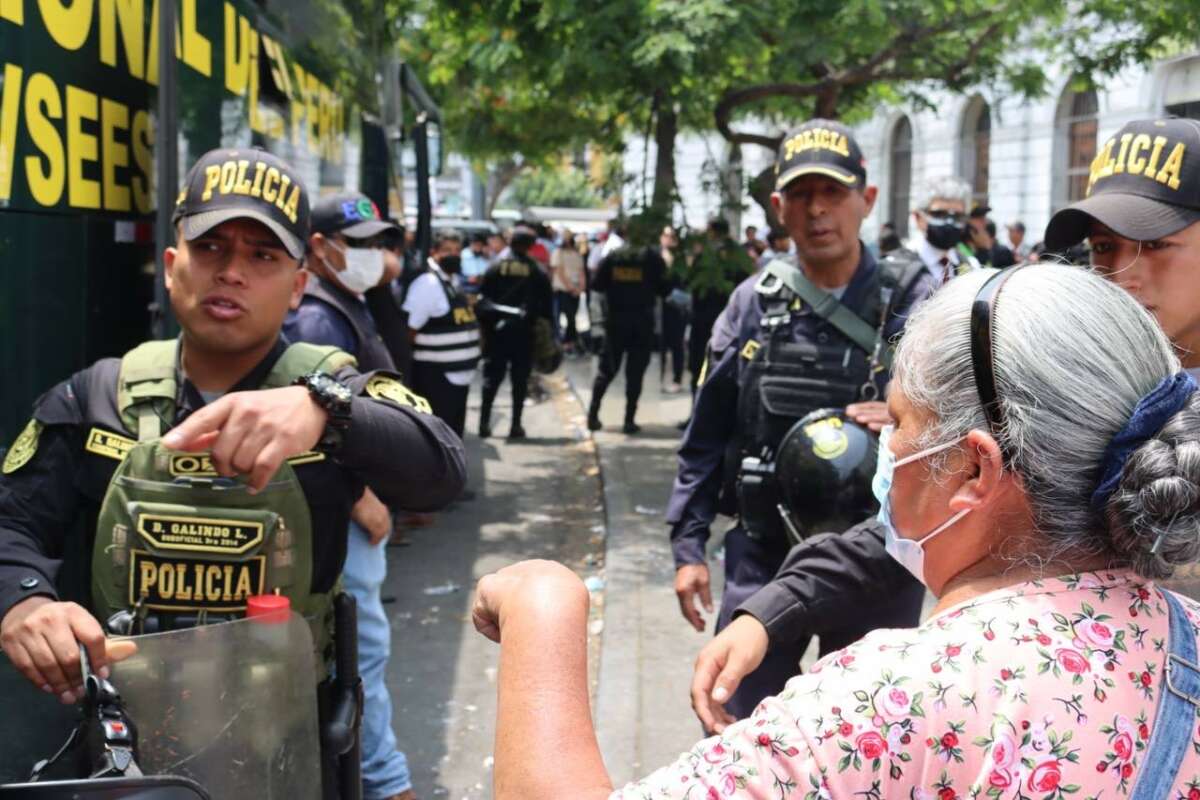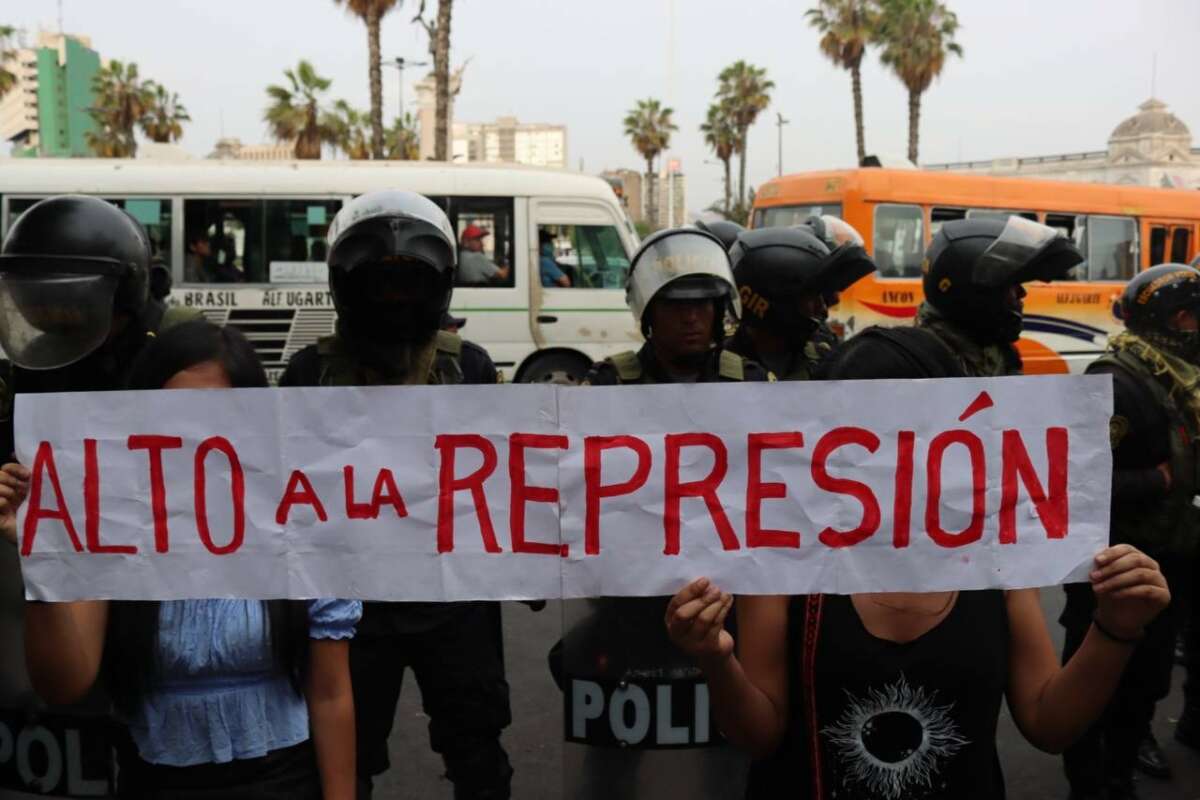On December 7, a soft coup took place in Peru involving the impeachment of the country’s President Pedro Castillo by the right-wing national Congress and his arrest by local police in Lima. Since then, the nation has exploded into massive protests followed by serious repression by government authorities. As of December 21, some 26 people have been killed and up to 500 protesters and security forces injured due to the violence while key roads throughout the country have been blocked. With five airports forced to close due to demonstrations, Peru’s Defense Minister Luis Alberto Otárola has declared a 30-day state of emergency, deploying the army throughout the Andean nation.
In Peru’s southern city of Ayacucho, seven protesters were killed by the military in just one day. More recently, two ministers from the new government headed by former Vice President Dina Boluarte have resigned: Education Minister Patricia Correa and Culture Minister Jair Pérez Brañez. Correa wrote on Twitter that she renounced her ministry because the “death of compatriots has no justification. State violence cannot be disproportionate and cause death.”
In a video circulating on social media, a Peruvian colonel, Guilmar Trujillo Lafitte, has apparently come out rejecting the state of emergency “that prevents the free expression of popular discontent in the face of the lack of legitimacy of the congress of the republic as well as Mrs. Dina Boluarte.” The colonel calls for new elections as well as the resignations of Peru’s minister of defense and the minister of interior — traditionally among the most powerful ministries in Latin American countries, given these positions are in charge of domestic security.
For many observers of Latin American politics, Castillo’s downfall could have been predicted long ago. Having won the June 2021 presidential election by a margin of just 44,000 votes out of nearly 19 million cast, Castillo, a former rural school teacher, only narrowly defeated his hard-right opponent Keiko Fujimori, daughter of the ex-dictator Alberto Fujimori. While Castillo’s leftist Free Peru Party was the largest in the country’s incoming Congress with 37 seats, his new government still faced a hostile far right majority headed by 24 members of Fujimori’s Popular Force, the second-largest party.
Using its power almost immediately, 15 days after Castillo’s appointment Congress and the Navy managed to pressure Foreign Relations Minister Héctor Béjar — a respected left-wing academic and intellectual — to resign based on his previous assertion that the use of terrorism in the country was first implemented in 1974 by Peru’s Navy, six years before the appearance of the bloody Maoist guerrilla group Shining Path in 1980.
While Béjar’s assertion is not conclusively supported by research, as government authorities’ involvement in state terror is predominantly documented from 1975 onward, discussions around Peru’s internal conflict from 1980 to 2000, between a right-wing U.S.-backed state and the Shining Path guerrillas and the Túpac Amaru Revolutionary Movement (MRTA), are highly controversial throughout society. In 2003 a Truth and Reconciliation Commission found that 69,280 people died or were disappeared in the conflict, with 46 percent of deaths attributed to the Shining Path and 30 percent to state agents. While Alberto Fujimori has long taken credit for defeating the guerrilla movements in Peru, in 2009 he was sentenced to 25 years prison for human rights crimes. Since then, his daughter Keiko has vigorously campaigned for his release and harshly attacked figures like Béjar who may try and point out the complexities of the conflict and critique the role of state forces.

Writing on Castillo’s fall, Latin American scholar Francisco Dominguez, a senior lecturer at Middlesex University, has recently noted: “Congress’ harassment aimed at preventing Castillo’s government from even functioning can be verified with numbers: in the 495 days he lasted in office, Castillo was forced to appoint a total of 78 ministers.” These appointments predominantly occurred due to Castillo capitulating to pressures that a right-wing Congress, the business community and the media placed on his original ministerial appointments as well as due to the infighting, fracturing and corruption that took place within his own party ranks.
Speaking to Truthout, Martin Scurrah, a retired Flinders University lecturer and expert on Peru, observed that for his part, “Castillo had limited political experience, mainly as leader of a teachers’ strike.” In fact, the former educator was not even a member of the political party whose banner he ran and won under in the 2021 presidential election. Scurrah adds: “In addition to the ceaseless opposition in congress and the media, Castillo proved to be inept and incompetent as president, unable to convert the support from teachers and people in rural areas, especially from the south of the country, into a coalition of support to enable him to govern.”
Furthermore, according to Scurrah, while Castillo was “unable to carry out any of the [structural] reforms he espoused in his political campaign, symbolically he represented and stood for the poor and marginalized, especially from rural areas, and in many specific decisions by his ministers did defend the rights of the poor.”
Speaking to Democracy Now!, Javier Puente, an associate professor and chair of Latin American and Latino studies at Smith College, noted Castillo’s “evangelical orientation,” which, in his opinion, “made him really socially conservative.” In addition, for Puente, the fact that Castillo was a former rondero campesino militia member is problematic, as ronderos “continue to be a form of paramilitarism” that “should come under scrutiny.” (Campesino militias played a large role in the civil war in Peru between 1980 and 2000.)
Taking the complexity of Castillo’s record into account, on December 7, Castillo gambled his presidency by attempting to shut down Congress using Article 134, which is allowed in cases of obstructionism by Congress. “Castillo’s decision to dissolve Congress was not supported or even known to his cabinet or most of his advisers, all of whom were convinced that the third attempt to impeach him did not have sufficient votes to be successful,” said Scurrah. “Thus, it seems to have been a personal, desperate decision supported by a very small group.”
According to Peruvian sociologist Eduardo González Cueva, while Castillo could be accused of an “attempted” coup, albeit tentative, what Congress then did was “a real coup.”
Following events as they developed, Zoila Acosta, a general practioner of medicine in the district of Lima, told Truthout that when Castillo left the presidential palace, he was heading to the Mexican embassy; however, “a special assault force was already waiting for him along the way” where “they stopped the vehicle, and the police diverted the presidential car to the prefecture where it was detained.”
“Now,” says Acosta, a “witch hunt” has already begun as authorities “want to imprison all of Castillo’s collaborators.” She notes that the Mexican ambassador to Peru has been given 72 hours to leave the country while a police squat team has surrounded the Mexican embassy in Lima.
With the exception of Brazil and Chile, Castillo’s removal has been condemned by numerous governments across Latin America, including those of Mexico, Argentina, Bolivia, Venezuela, Honduras and Colombia. The day after the Castillo’s removal, Mexican President Andrés Manuel López Obrador claimed the former president called him to say he was on his way to the Mexican embassy in Lima to request asylum. Rejecting Castillo’s overthrow, López Obrador harshly critiqued Castillo’s treatment by the “political and economic elites” of Peru. On December 15, in a meeting in Havana, Cuba, of the leftist bloc known as the Bolivarian Alliance for the Americas (ALBA), 10 member countries — including Cuba, Venezuela, Bolivia, Nicaragua and several smaller Caribbean Island states — condemned Castillo’s overthrow.
The reaction to these developments in Peru has been quite different in Washington, as the Biden administration quickly recognized the new regime in Lima. With the United States’ Ambassador to Peru Lisa Kenna rejecting Castillo’s attempt to close Congress, by December 8, the U.S. State Department declared that: “The United States welcomes President Boluarte and hopes to work with her administration to achieve a more democratic, prosperous, and secure region.”
Asked about the White House’s position, Dominguez told Truthout, “It has been reported that U.S. ambassador to Peru (a ‘former’ CIA agent), Lisa Kenna, not only met Peru’s minister of defense one day before the coup, but on the day when Castillo made the TV appearance to close Congress, etc., she issued an immediate note (on behalf of the U.S.) condemning Castillo’s statement and demanded Peru’s Congress was ‘allowed to fulfil its mandate’ which was to oust President Castillo.”

“Protests continue across the country, and road blockades of key highways and roads in the rural [areas] are still in effect. With the passing of the days, the repression, and the attitude of Dina Boluarte, the media and the Congress, the anger and indignation of the people only grows,” Zoe Alexandra, who is currently in Lima working for Peoples Dispatch, told Truthout. “Key demands include the immediate release and restitution of Pedro Castillo, the resignation of Dina Boluarte, the dissolution of the Congress, the installation of a Constituent Assembly, and justice for the 25+ fatal victims of police repression and the hundred injured and trial for those that have ordered this repression.”
Whether Boluarte’s U.S.-backed administration survives this crisis remains to be seen. In the last six years, Peru has had seven presidents, and polls indicate support for Congress is extremely low among voters. With Congress recently rejecting Boluarte’s request for constitutional reform but allowing for new elections to take place in early 2024, a rapid end to the current crisis appears unlikely.
Join us in defending the truth before it’s too late
The future of independent journalism is uncertain, and the consequences of losing it are too grave to ignore. To ensure Truthout remains safe, strong, and free, we need to raise $27,000 in the next 24 hours. Every dollar raised goes directly toward the costs of producing news you can trust.
Please give what you can — because by supporting us with a tax-deductible donation, you’re not just preserving a source of news, you’re helping to safeguard what’s left of our democracy.
